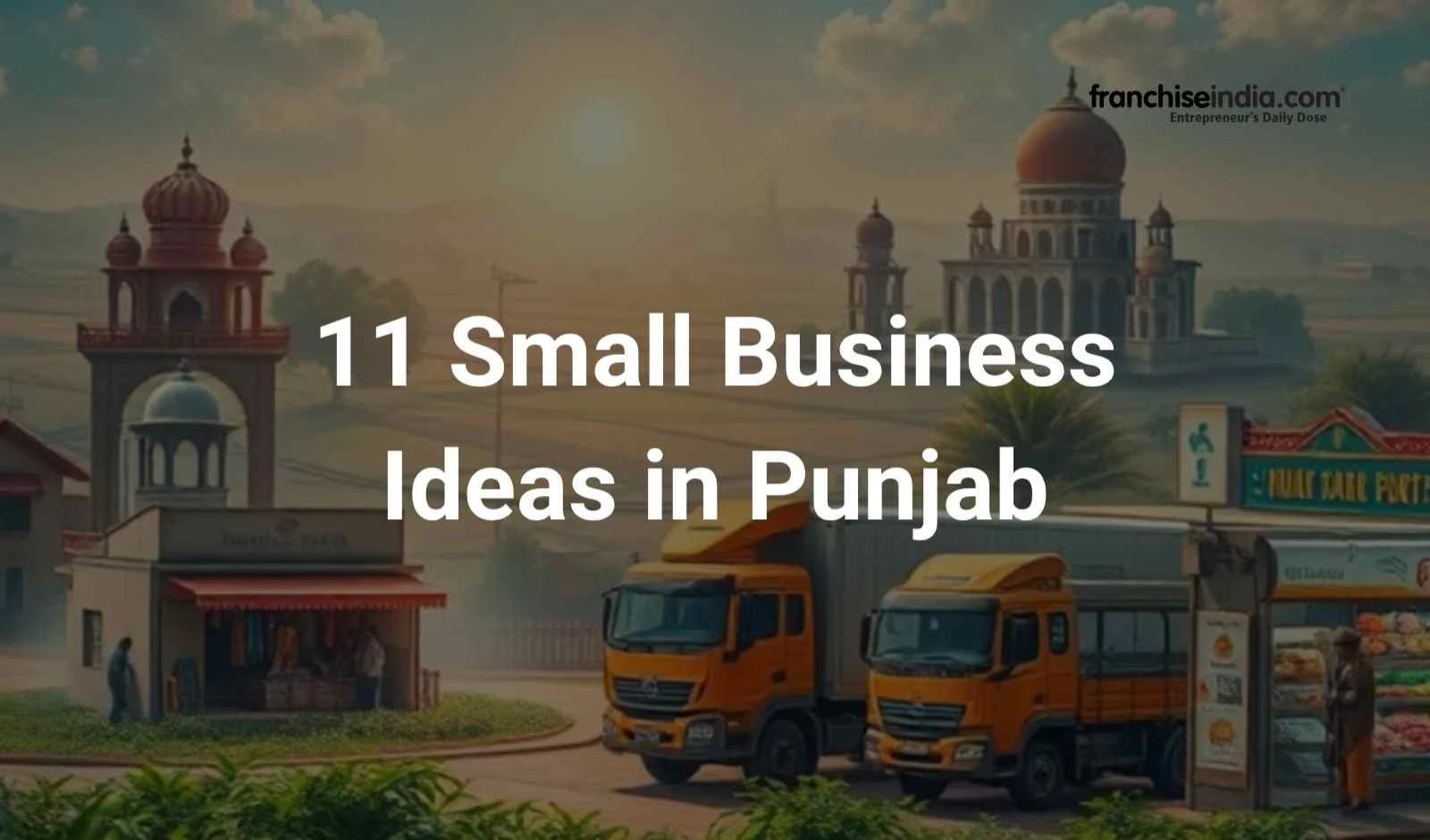
There’s no shortage of opportunities—think dairy processing, poultry, food manufacturing, and cold-chain logistics. These agro-linked businesses thrive because raw materials are everywhere and demand never really dips. On top of that, textile and tech-textile outfits do well, riding on Punjab’s strong manufacturing tradition. Bakeries and food startups add even more flavor, thanks to the state’s love for good food. If you’re looking at services, stuff like mobile repair shops, skills training centers, or rural tourism needs less cash to start but catches on fast because people actually want and need them. Even renewable energy ideas—solar pump rentals or rooftop solar installs—are picking up speed as folks hunt for cheaper power. Whether you’ve got ₹50,000 or ₹50 lakh to invest, these 11 business ideas fit all kinds of budgets and backgrounds. Anyone willing to use Punjab’s good roads, solid supply chains, and business-friendly policies stands a real shot at making a profit.
Also read: How to Start a Pizza Business?
Here are 11 Small Business Ideas in Punjab
1) Dairy micro-unit: fresh milk, paneer & flavoured dairy

Starting a small dairy collection and processing unit—making paneer, ghee, curd, or flavored milk—is a smart move here. Punjab has some of the highest milk production per person in India, and local farmers are already set up for it. So if you’re in a village or just outside a city, dairy processing feels like a natural next step. You can get started with a small pasteurizer, a churner, and a cold storage unit for about ₹2.5–6 lakh. If you want to go bigger, with a mini dairy and bottling setup, you’re looking at ₹8–25 lakh. The whole sector is on the rise, with processed dairy products growing at around 10–12% a year. To keep things running smoothly, you’ll need an FSSAI license, a steady supply from farmers, refrigerated transport, some basic lab testing, and a simple distribution network. Quality matters—so does timing, since milk supply changes with the season. That’s why value-added products really help boost profits and keep risks low.
2) Small food-processing / frozen ready-to-eat (RTE) unit
.png)
Setting up a frozen snacks and ready-meals manufacturing unit—producing items like frozen parathas, momos, cutlets, and heat-and-eat meals—offers a strong opportunity in Punjab. Punjab’s got wheat, veggies, and dairy in spades, so making things like frozen parathas, momos, cutlets, and heat-and-eat meals just makes sense. The government is pushing food processing as a priority, so support is there if you want it. You can start a micro-unit with a basic setup—GMP area, blast freezer, packing—for ₹6–18 lakh. Want to scale up? A branded, medium-sized plant with better cold-chain systems runs about ₹20–60 lakh. The frozen foods market in India keeps climbing, with demand for easy, ready-to-cook stuff only getting stronger. You’ll need FSSAI paperwork, solid hygiene, good freezing tech, and reliable retail or e-commerce partners. While cold-chain costs can sting, starting local—with retailers and HoReCa clients—helps keep things steady. Good-looking packaging and real shelf-life testing also go a long way in winning over customers and growing for the long haul.
3) Cold-chain & refrigerated logistics for perishables
.png)
Cold-chain logistics is another hot spot as Punjab’s farms churn out loads of veggies, fruit, dairy, and other perishables, but when harvest hits, there’s never enough cold storage. That’s where a last-mile refrigerated logistics service really pays off. You could start with a single refrigerated van (or retrofit a vehicle) for ₹6–12 lakh or set up a modular cold room—10 to 50 tonnes—costing ₹10–40 lakh, depending on how fancy you go. The food cold-chain sector is growing fast, driven by food processing and organized retail, with growth rates that keep investors happy. To succeed, make sure you’ve got your permits, keep the cooling equipment in good shape, lock down steady contracts with farmers or processors, and always track your temps. Energy costs can eat into profits, but smarter routes and solar-powered refrigeration can help keep those bills down over time.
4) Specialized textile / technical textiles unit (embroidery, technical fabric)
.png)
Setting up a value-added textile unit in Punjab—whether you’re into embroidery, fabric finishing, or technical textiles like masks and filters—just fits. The state’s got history in textiles and a pool of skilled workers ready to go.
Punjab’s got a lively ecosystem for both old-school garment work and new, fast-growing areas like technical textiles. If you’re thinking of getting started, you don’t need a fortune—just ₹3–10 lakh for a small embroidery or processing unit. Going bigger, technical textile setups usually need ₹12–40 lakh, depending on how advanced you want your machinery. The textile industry in India just keeps growing and reports keep throwing out numbers like 8–10% CAGR, sometimes higher, and it doesn’t look like it’s slowing down.
To actually make it in this field, you’ll need steady electricity, skilled machine operators, a solid catalogue of samples, and a reliable B2B sales pipeline—think garment factories and exporters. Export orders can be unpredictable, so it pays to spread your bets: work with both domestic buyers and niche technical segments. That way, you keep the money flowing and find those higher-margin
Also read: Why start a Momo Business this Winter?
5) Organic/high-value farming (millets, herbs, basmati value-add)
.png)
Launching a value-added agriculture business in Punjab—such as contract organic farming, millet processing, or drying and packaging herbs like turmeric, fenugreek, and basil—offers strong potential due to the state’s robust agricultural base and the rising national demand for healthy, natural foods. Urban buyers and export markets want millets, organic staples, and herb products with clean labels. The government’s also pushing food processing as a big growth area. You can get started with a small unit for ₹2–8 lakh or set up a larger contract-farming and packaging operation with about ₹5–15 lakh. Health food and organic categories are growing fast, riding the wave of India’s expanding food-processing sector—again, growth rates land somewhere between mid-single-digit and low-double-digit CAGR. To stand out, lock down farmer contracts, get organic certification if you need it, invest in the right cleaning and drying equipment, and focus on building a strong brand for retail. Certification takes time, but starting small and targeting premium stores or D2C ecommerce helps you gain traction and better margins right out of the gate.
6) Poultry & hatchery (small to medium)
.png)
Poultry farming in Punjab offers a promising small-business opportunity, whether you choose broiler rearing, layer farming, or a contract-growing model. The state’s abundant grain production helps keep feed costs low, while demand for poultry meat and eggs continues to rise across local markets and nearby export hubs. Punjab’s grain production keeps feed affordable, and demand for chicken and eggs is climbing fast in local and export markets. A small setup for 1,000–2,000 birds usually takes ₹6–15 lakh for the basics—sheds, feeders, and chicks. If you’re thinking bigger, a mechanized hatchery will run you ₹20–50 lakh. Poultry’s one of the fastest-growing protein segments in India, with steady demand for processed poultry and eggs keeping growth strong.
If you want to do well, you need to stay on top of biosecurity, keep good ties with vets, make sure your feed supply never falters, and build dependable sales channels. Also there’s risk—disease outbreaks, price swings—but with proper vaccination, insurance, and contract selling, you dodge most of the big headaches.
7) Bakery / artisanal foods .png)
Punjab’s food scene is vibrant, and there’s a real market for bakeries—whether it’s a small home bakery, artisanal Amritsari treats, or a cloud kitchen selling to cafés. People love regional specialties like Amritsari kulcha and traditional snacks, and the market’s only getting bigger, thanks to urbanization and changing eating habits. Setting up a home or cloud kitchen bakery takes around ₹1.5–5 lakh, while a full-scale shop with professional gear might need ₹6–20 lakh.
To get started, register with FSSAI, pick up the right food and shop licenses, and invest in ovens, proofers, and good packaging. Competition can be stiff, but you can stand out with unique recipes, top-notch ingredients, and a strong presence—whether in-store or online.
8) Rural tourism / homestays + experiential tours
.png)
Punjab is rich in religious and cultural attractions—places like Amritsar, Wagah, and loads of historical sites. Rural, culinary, and medical tourism are all on the rise, pulling in a mix of visitors. You can start a basic homestay with just 1–3 renovated rooms for ₹2–8 lakh or go for a small guesthouse with more facilities, which usually needs ₹10–40 lakh.
Tourism in India continues to recover strongly, with national data indicating a healthy multi-year CAGR driven by increasing domestic travel and experiential tourism trends. To succeed, ensure local permits, maintain clean and welcoming rooms, curate authentic cultural experiences, and collaborate with travel agents or OTAs. While seasonality can impact occupancy, offering weekend packages, wedding-related stays, and partnerships in medical tourism can help maintain consistent demand.
9) Mobile repair & electronics service centre
.png)
Starting a mobile and small-appliance repair business in Punjab is a practical, low-investment opportunity driven by rising smartphone usage and constant repair needs. People can’t live without their phones and gadgets, and they break all the time. You don’t need a ton of money to get going—anywhere from ₹50,000 up to around ₹3 lakh, depending on whether you’re opening a small kiosk or a full shop and what kind of tools and spare parts you grab at the start. With smartphones and devices everywhere, especially in cities and growing towns, more folks keep needing repairs. The electronics repair market just keeps getting bigger—industry experts say it’s growing steadily at around 8–10% every year, so you’re looking at a business with steady demand.
What you really need is skilled repair techs, good diagnostic tools, and a stash of common parts. Don’t forget an online presence—it makes a difference for local customers who want to find you fast. The main headaches come from fake parts and unreliable suppliers. You’ll build trust (and repeat business) by sticking with dependable vendors, being upfront about pricing, and offering a service warranty.
Also read: How to Start an Event Management Business in India
10) Skill training & coaching centre (agri-skilling, digital skills)
.png)
Setting up a vocational training center in Punjab is another strong bet, especially with the state’s young population and folks moving from villages to cities looking for jobs. You can start small, investing ₹1–6 lakh to set up a basic classroom and offer practical courses—think digital marketing, language classes, dairy management, or training in cold-chain logistics. If you want to offer hands-on training with labs—maybe IT labs, sewing and textile units, or coding classrooms—your initial investment bumps up to ₹6–20 lakh. The skilling and EdTech sector is on the rise, thanks to government pushes and more people wanting job-ready skills. To make your center stand out, tailor your courses to what local employers actually need, lock in placement partnerships, and hand out certifications that mean something in the job market. There’s competition, but if you’re serious about helping students land jobs and link up with businesses or government training schemes, you’ll see more people signing up and sticking with you.
11) Renewable energy for farms (solar pump rentals & rooftop solutions)
.png)
Solar-focused services in Punjab offer a strong small-business opportunity, driven by high farm electricity demand, rising mechanization, and state incentives for clean energy adoption. You can get started by renting out solar irrigation pumps, usually costing ₹1.5–6 lakh each depending on how powerful they are. Rooftop solar for homes or small shops is a lighter investment, usually between ₹80,000 and ₹3 lakh. India’s renewable energy scene is booming, driven by policies and subsidies. To run things smoothly, work with certified vendors, offer farmers easy financing or EMI plans, and set up a solid maintenance program. Sure, the paperwork for subsidies can drag, but if you offer rental or pay-per-use options, you make it much easier for farmers to jump in. Done right, this business brings steady demand and room to grow.
How to choose the right idea for you
When you’re picking a small business idea in Punjab, match it with what the area actually needs and what you have to offer. If you’re near farms or in smaller towns, agro-based businesses—like dairy, food processing, poultry, or cold-chain logistics—make a lot of sense. In cities, you’ll have better luck with stuff like bakeries, repair shops, training centers, or other service businesses. Think about your own skills and how much money you want to put in. For beginners, service businesses with lower investment are safer. If you’ve got experience, you might take the plunge into something bigger like food processing or poultry. Always check what people around you are buying and who your customers are—wholesale buyers, local stores, hotels, or direct retail. Watch for seasonal peaks, especially around festivals, weddings, and religious tourism—they can give you a nice revenue boost. Make sure you handle all the paperwork and approvals you need, whether that’s FSSAI registration, municipal permits, or environmental clearances. And don’t forget to look ahead—think about how you’ll scale up, maybe by opening more outlets, franchising, or launching your own branded products for a wider market.
You might also like: How to Start a Food Processing Business in India

